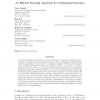Free Online Productivity Tools
i2Speak
i2Symbol
i2OCR
iTex2Img
iWeb2Print
iWeb2Shot
i2Type
iPdf2Split
iPdf2Merge
i2Bopomofo
i2Arabic
i2Style
i2Image
i2PDF
iLatex2Rtf
Sci2ools
115
click to vote
ICML
1998
IEEE
1998
IEEE
An Efficient Boosting Algorithm for Combining Preferences
We study the problem of learning to accurately rank a set of objects by combining a given collection of ranking or preference functions. This problem of combining preferences arises in several applications, such as that of combining the results of different search engines, or the "collaborative-filtering" problem of ranking movies for a user based on the movie rankings provided by other users. In this work, we begin by presenting a formal framework for this general problem. We then describe and analyze an efficient algorithm called RankBoost for combining preferences based on the boosting approach to machine learning. We give theoretical results describing the algorithm's behavior both on the training data, and on new test data not seen during training. We also describe an efficient implementation of the algorithm for a particular restricted but common case. We next discuss two experiments we carried out to assess the performance of RankBoost. In the first experiment, w...
Related Content
| Added | 17 Nov 2009 |
| Updated | 17 Nov 2009 |
| Type | Conference |
| Year | 1998 |
| Where | ICML |
| Authors | Yoav Freund, Raj D. Iyer, Robert E. Schapire, Yoram Singer |
Comments (0)

